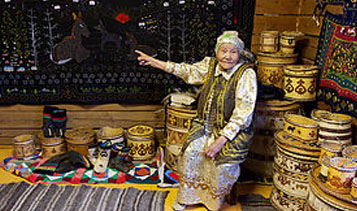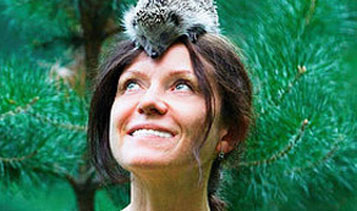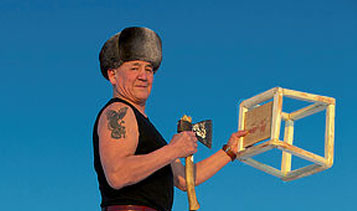

July 8, 2015 | Galya Morrell
My blogs:




Travels with the Nomad:
October 31, 2015 | Galya Morrell
Matters of Health:
June 10, 2015 | Galya Morrell
Russian Telegraph:
May 1, 2015 | Galya Morrell
Travels with the Nomad:
October 31, 2015 | Galya Morrell
Matters of Health:
June 10, 2015 | Galya Morrell
Russian Telegraph:
May 1, 2015 | Galya Morrell
In the last three weeks we met three orphans who were so poor, so neglected and so desolate that they had little chance for survival. But they did survive – miraculously, and eventually got so strong that when they grew up they became spiritual leaders in their communities. And yes, they lived through wars and hunger, through civil disorders and loss of husbands and children, through the worst nighmares one can only imagine, life was not easy at all, but they did not «lose themselves».
….And now let’s talk about orphans.
There is an old legend that goes like this: once upon a time there was an oprhan who was so poor, so neglected, so filthy and so ugly that no one wanted even to look at him. No one loved him, no one at all, so he was forced to live like a shadow, hiding from people behind the kachelofen and picking up seeds after mice. In the winter time, when temperatures dropped to -60C, he lived with Yakutian horses, ouside on the snow. The horses adopted him, raised him as one of their own and gave him some very special powers. When the horse orphan grew up he turned into a very powerful shaman who healed many people and protected the land he lived on.
Anna Nikolaevna Akimova. Maria Vlasievna Petrova. Praskovia Petrovna Matannakova. Today they are 80, 92 and 93. Three artists, they still work from early morning till late night, take care of their big families and dream about the future.
We asked them all the same question. «What is your secret of a good life?» What is it? Is it what you eat? Is it what you dream? Is it whom you love?
And we also asked them: How do you deal with pain? How do you deal with despair? Where do you get your will to live further when there is no will left?
And we also asked them: «What is happiness and how to obtain it?»
Anna Nikolaevna Akimova. She does not remember her mother who died in childbirth. From the young age of 5 she learned to handle the needle and never stopped since. But of course, not only did she sew – but she also milked cows, rode horses, irrigated land and cooked for a community of 80. When the war started in 1941, she was 7. She worked at the job of an adult man; all men were gone to the front. For her work she received only a half-cup of empty soup. In the fall, children were allowed to go onto kolkhoz fields and dig into mice’s holes. «Mice are hard workers. And their holes were full of little grains. Stalin could not persecute them for «stealing» from kokhoz field – so they were richer than us, people. The day when I found a «hole» was the biggest celebration. This was happiness!»
Anna created the collection of Yakutian national costumes which are now kept in her privately owned museum in Tuora-Kyuyol. She payed for the museum out of her pension which is scarce.
And now the «birthday story». Since Anna was an orphan, she does not know her birthday. She does not have a birth certificate, therefore she does not have a passport. She has applied for one recently and now she is waiting for a response. Hopefully she will get one soon. She still needs to choose the date of her birth. Maybe January 1, 1932? Are there any better ideas?
Maria Vlasievna Petrova is 90. She too took a needle at 6. She started to sew from birch bark to survive. She too went through war and hunger. She too went through loss of children. But look in her eyes: they are shining! «The «trick» is to work – never be lazy – and give to the others.» «I work and I live». She never had a «depression», she never hated nor blamed the others. She accepted and adopted. And kept loving. What was her worst life experience? The death of ther father. She was a child when he died. Everyone was gone to the front. She was all alone with her dead father in the empty house. She needed to figure out how to build a coffin and bury him in the frozen land. «That was the hardest», she says. But the hardships did not ruin her heart, they just quenched her character like steel.»
Praskovia Petrovna Matannakova is 93. She too sews out of birch bark. Her memory is sharper than her needle and her eyes are like scanners: she notices the smallest things, invisible to others. She says: «Life is hard, but people make it harder than it is. One can spend years on complaining and pitying oneself and lose his time which is the biggest asset. Don’t eat too much. Don’t hate. Work. Use your hands. Use your heart. Remember your past. Share. Love.» Praskovia is the Sun of Debdirge – the Sun that is never too tired to shine.
© 2013 Galya Morrell
© 2013 Galya Morrell
Three orphans – three life stories. And look at all the children who follow their steps. They know the history, they follow the tradition – because of them – that’s why Taatta has a future!
In Taatta everyone has a future. Even us – the vagabonds.
We may look busted, filthy and not attractive. But the Mother’s heart only knows Beauty. After having lived with us for 3 weeks Anna decided to adopt us as her own children. She already had 9. Then she had lost one after he fell through the ice on his tractor. And now she will have 10. Next year all 10 will celebrate her Birthday for the first time ever in her life.







